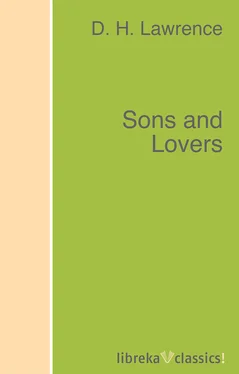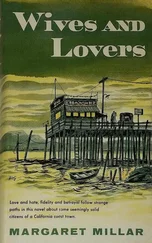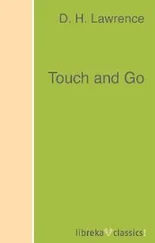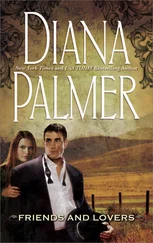D. Lawrence - Sons and Lovers
Здесь есть возможность читать онлайн «D. Lawrence - Sons and Lovers» — ознакомительный отрывок электронной книги совершенно бесплатно, а после прочтения отрывка купить полную версию. В некоторых случаях можно слушать аудио, скачать через торрент в формате fb2 и присутствует краткое содержание. ISBN: , Жанр: Языкознание, на английском языке. Описание произведения, (предисловие) а так же отзывы посетителей доступны на портале библиотеки ЛибКат.
- Название:Sons and Lovers
- Автор:
- Жанр:
- Год:неизвестен
- ISBN:9783742901897
- Рейтинг книги:4 / 5. Голосов: 1
-
Избранное:Добавить в избранное
- Отзывы:
-
Ваша оценка:
- 80
- 1
- 2
- 3
- 4
- 5
Sons and Lovers: краткое содержание, описание и аннотация
Предлагаем к чтению аннотацию, описание, краткое содержание или предисловие (зависит от того, что написал сам автор книги «Sons and Lovers»). Если вы не нашли необходимую информацию о книге — напишите в комментариях, мы постараемся отыскать её.
Immerse yourself in well-known and popular titles!
Sons and Lovers — читать онлайн ознакомительный отрывок
Ниже представлен текст книги, разбитый по страницам. Система сохранения места последней прочитанной страницы, позволяет с удобством читать онлайн бесплатно книгу «Sons and Lovers», без необходимости каждый раз заново искать на чём Вы остановились. Поставьте закладку, и сможете в любой момент перейти на страницу, на которой закончили чтение.
Интервал:
Закладка:
One of the corners caught her brow as the shallow drawer crashed into the fireplace. She swayed, almost fell stunned from her chair. To her very soul she was sick; she clasped the child tightly to her bosom. A few moments elapsed; then, with an effort, she brought herself to. The baby was crying plaintively. Her left brow was bleeding rather profusely. As she glanced down at the child, her brain reeling, some drops of blood soaked into its white shawl; but the baby was at least not hurt. She balanced her head to keep equilibrium, so that the blood ran into her eye.
Walter Morel remained as he had stood, leaning on the table with one hand, looking blank. When he was sufficiently sure of his balance, he went across to her, swayed, caught hold of the back of her rocking-chair, almost tipping her out; then leaning forward over her, and swaying as he spoke, he said, in a tone of wondering concern:
"Did it catch thee?"
He swayed again, as if he would pitch on to the child. With the catastrophe he had lost all balance.
"Go away," she said, struggling to keep her presence of mind.
He hiccoughed. "Let's—let's look at it," he said, hiccoughing again.
"Go away!" she cried.
"Lemme—lemme look at it, lass."
She smelled him of drink, felt the unequal pull of his swaying grasp on the back of her rocking-chair.
"Go away," she said, and weakly she pushed him off.
He stood, uncertain in balance, gazing upon her. Summoning all her strength she rose, the baby on one arm. By a cruel effort of will, moving as if in sleep, she went across to the scullery, where she bathed her eye for a minute in cold water; but she was too dizzy. Afraid lest she should swoon, she returned to her rocking-chair, trembling in every fibre. By instinct, she kept the baby clasped.
Morel, bothered, had succeeded in pushing the drawer back into its cavity, and was on his knees, groping, with numb paws, for the scattered spoons.
Her brow was still bleeding. Presently Morel got up and came craning his neck towards her.
"What has it done to thee, lass?" he asked, in a very wretched, humble tone.
"You can see what it's done," she answered.
He stood, bending forward, supported on his hands, which grasped his legs just above the knee. He peered to look at the wound. She drew away from the thrust of his face with its great moustache, averting her own face as much as possible. As he looked at her, who was cold and impassive as stone, with mouth shut tight, he sickened with feebleness and hopelessness of spirit. He was turning drearily away, when he saw a drop of blood fall from the averted wound into the baby's fragile, glistening hair. Fascinated, he watched the heavy dark drop hang in the glistening cloud, and pull down the gossamer. Another drop fell. It would soak through to the baby's scalp. He watched, fascinated, feeling it soak in; then, finally, his manhood broke.
"What of this child?" was all his wife said to him. But her low, intense tones brought his head lower. She softened: "Get me some wadding out of the middle drawer," she said.
He stumbled away very obediently, presently returning with a pad, which she singed before the fire, then put on her forehead, as she sat with the baby on her lap.
"Now that clean pit-scarf."
Again he rummaged and fumbled in the drawer, returning presently with a red, narrow scarf. She took it, and with trembling fingers proceeded to bind it round her head.
"Let me tie it for thee," he said humbly.
"I can do it myself," she replied. When it was done she went upstairs, telling him to rake the fire and lock the door.
In the morning Mrs. Morel said:
"I knocked against the latch of the coal-place, when I was getting a raker in the dark, because the candle blew out." Her two small children looked up at her with wide, dismayed eyes. They said nothing, but their parted lips seemed to express the unconscious tragedy they felt.
Walter Morel lay in bed next day until nearly dinner-time. He did not think of the previous evening's work. He scarcely thought of anything, but he would not think of that. He lay and suffered like a sulking dog. He had hurt himself most; and he was the more damaged because he would never say a word to her, or express his sorrow. He tried to wriggle out of it. "It was her own fault," he said to himself. Nothing, however, could prevent his inner consciousness inflicting on him the punishment which ate into his spirit like rust, and which he could only alleviate by drinking.
He felt as if he had not the initiative to get up, or to say a word, or to move, but could only lie like a log. Moreover, he had himself violent pains in the head. It was Saturday. Towards noon he rose, cut himself food in the pantry, ate it with his head dropped, then pulled on his boots, and went out, to return at three o'clock slightly tipsy and relieved; then once more straight to bed. He rose again at six in the evening, had tea and went straight out.
Sunday was the same: bed till noon, the Palmerston Arms till 2.30, dinner, and bed; scarcely a word spoken. When Mrs. Morel went upstairs, towards four o'clock, to put on her Sunday dress, he was fast asleep. She would have felt sorry for him, if he had once said, "Wife, I'm sorry." But no; he insisted to himself it was her fault. And so he broke himself. So she merely left him alone. There was this deadlock of passion between them, and she was stronger.
The family began tea. Sunday was the only day when all sat down to meals together.
"Isn't my father going to get up?" asked William.
"Let him lie," the mother replied.
There was a feeling of misery over all the house. The children breathed the air that was poisoned, and they felt dreary. They were rather disconsolate, did not know what to do, what to play at.
Immediately Morel woke he got straight out of bed. That was characteristic of him all his life. He was all for activity. The prostrated inactivity of two mornings was stifling him.
It was near six o'clock when he got down. This time he entered without hesitation, his wincing sensitiveness having hardened again. He did not care any longer what the family thought or felt.
The tea-things were on the table. William was reading aloud from "The Child's Own", Annie listening and asking eternally "why?" Both children hushed into silence as they heard the approaching thud of their father's stockinged feet, and shrank as he entered. Yet he was usually indulgent to them.
Morel made the meal alone, brutally. He ate and drank more noisily than he had need. No one spoke to him. The family life withdrew, shrank away, and became hushed as he entered. But he cared no longer about his alienation.
Immediately he had finished tea he rose with alacrity to go out. It was this alacrity, this haste to be gone, which so sickened Mrs. Morel. As she heard him sousing heartily in cold water, heard the eager scratch of the steel comb on the side of the bowl, as he wetted his hair, she closed her eyes in disgust. As he bent over, lacing his boots, there was a certain vulgar gusto in his movement that divided him from the reserved, watchful rest of the family. He always ran away from the battle with himself. Even in his own heart's privacy, he excused himself, saying, "If she hadn't said so-and-so, it would never have happened. She asked for what she's got." The children waited in restraint during his preparations. When he had gone, they sighed with relief.
He closed the door behind him, and was glad. It was a rainy evening. The Palmerston would be the cosier. He hastened forward in anticipation. All the slate roofs of the Bottoms shone black with wet. The roads, always dark with coal-dust, were full of blackish mud. He hastened along. The Palmerston windows were steamed over. The passage was paddled with wet feet. But the air was warm, if foul, and full of the sound of voices and the smell of beer and smoke.
Читать дальшеИнтервал:
Закладка:
Похожие книги на «Sons and Lovers»
Представляем Вашему вниманию похожие книги на «Sons and Lovers» списком для выбора. Мы отобрали схожую по названию и смыслу литературу в надежде предоставить читателям больше вариантов отыскать новые, интересные, ещё непрочитанные произведения.
Обсуждение, отзывы о книге «Sons and Lovers» и просто собственные мнения читателей. Оставьте ваши комментарии, напишите, что Вы думаете о произведении, его смысле или главных героях. Укажите что конкретно понравилось, а что нет, и почему Вы так считаете.











